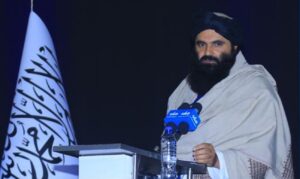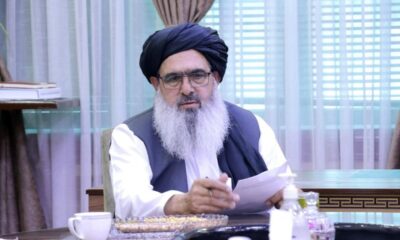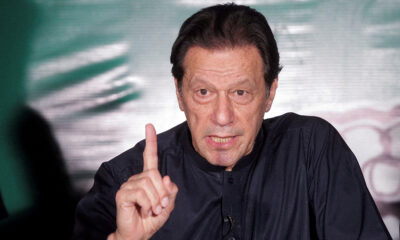Latest News
Haqqani delivers speech to security forces, warns the public unlicensed weapons are illegal
GDI head rejected repeated claims by international organizations and countries that some militant groups are active in Afghanistan.
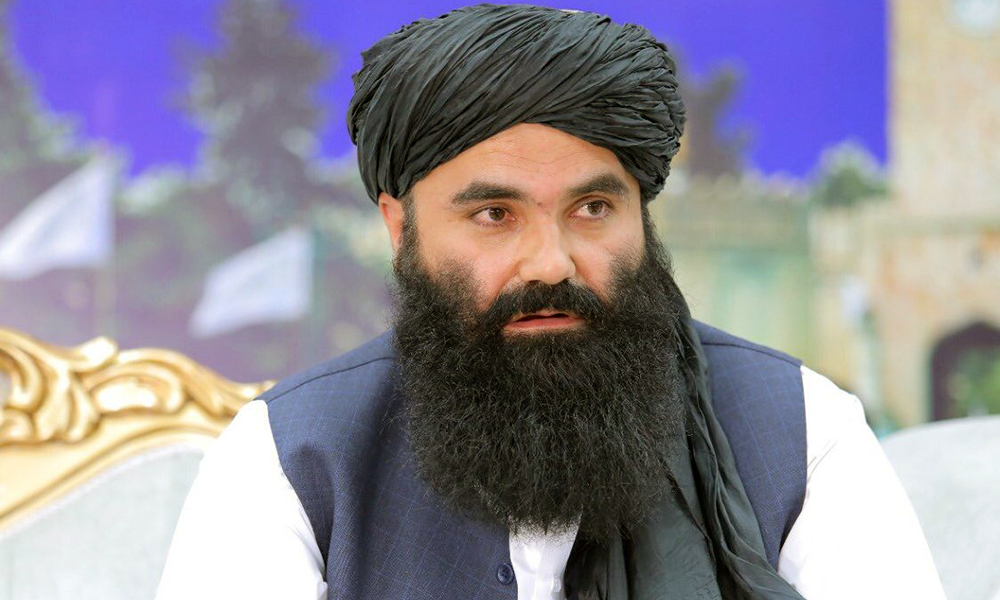
Acting Minister of Interior Affairs, Sirajuddin Haqqani made it clear on Thursday that it is illegal to carry unlicensed weapons in the country.
Addressing an ‘appreciation ceremony’ for security forces, Haqqani said this applies to both individuals and companies. He said individuals and companies need permits to have weapons.
He also spoke about security across the country and said sincerity, good management and improved services of security forces are the basis of providing a solid security platform for the people.
“Today, the security created in our country is basically the product of the rule of the Sharia system. The security created is in fact a great blessing from Allah, whose durability lies in gratitude to the Almighty Allah, obedience to the Sharia ruler (the supreme leader), better interaction with the people, and harmony among themselves,” said Haqqani.
According to him, all factors that cause instability of society must be prevented in the Sharia system.
“Without responsible persons, no one has the right to carry weapons without a permit, apart from the Emirate’s organizations; if it is security companies, businessmen, the private sector, or any person who wants to carry weapons they must obtain permits,” Haqqani added.
He also warned that any responsible person who undermines the security of the people will be investigated by the authorities.
Regarding the structure of the Ministry of Interior Affairs, he said that there are approximately 230,000 policemen and efforts are being made by the ministry to “professionalize” them.
Haqqani also said that another major factor in ensuring security is good coordination between the ministries of interior, defense and the General Directorate of Intelligence (GDI), which he said “has won the trust of the people and the world.”
The GDI head, Abdulhaq Wasiq, said at the same event that the three entities have joint and separate responsibilities in terms of preventing crime, ensuring national security and other tasks. He also said these three bodies also work with other ministries when needed.
Wasiq said GDI performs its duties in accordance with the law and that all laws have been approved according to Islamic Sharia and Hanafi jurisprudence. He said the laws have been approved by scholars and experts of the relevant department, and ratified by the supreme leader of the Islamic Emirate.
“Unlike the structure and strategy of the past intelligence organizations, the intelligence officers of the Islamic Emirate are bound by Islamic Sharia and the law. When they commit a violation, they are investigated. Alhamdulillah, intelligence (GDI) is now a reformed and law-abiding organization,” said Wasiq.
He also said “negative propaganda” is occasionally detected by some circles that attempt to present a false image of the directorate.
“This propaganda is a one-sided lie, the facts are clear to the people of Afghanistan and all the countries of the world, and these biased circles are known by all the countries of the region and the world who want peace and prosperity in the world,” he added.
According to him, Afghanistan is now on the list of safe countries in the world, terrorist groups have been suppressed, and have been forced to flee Afghanistan. He said: “They are now outside the borders of Afghanistan.”
“Our security performance has proven to the world that the Islamic Emirate has the capacity to provide Afghanistan’s security and can fulfill its obligations in this regard.”
Wasiq did however call on the international community to make sure they had the facts and not believe false information.
“The media reports about the presence of various [terrorist] groups in Afghanistan are not true, but all these reports are political and are aimed at misleading the public.”
Wasiq also rejected repeated claims by international organizations and countries that some militant groups are active in Afghanistan.
He said it was the opposite and that “Afghanistan is a victim of the destructive activities of some groups that have centers and operate in the neighborhood of Afghanistan and the region.”
According to him, the Islamic Emirate of Afghanistan has not only ensured the physical security of the people, but also paid special attention to maintaining psychological security.
Wasiq also said the current security situation in the country was a divine blessing and asked the people to cooperate with security institutions.
He also urged security officials to focus on their responsibilities and respect the people.
Haqqani meanwhile once again called on Afghans who live abroad to return to their homeland and stand by the regime.
He said: “Afghanistan is the common home of all Afghans and the dignity of each person is protected in his home.”
He assured the people and all embassies and diplomatic missions in Afghanistan that the police force in coordination with the defense and intelligence departments are responsible for their security and will be at their service around the clock.
He added that while Afghanistan’s assets are unjustly blocked and the country is subjected to economic sanctions, the Ministry of Interior has managed to eradicate drug cultivation on the orders of the leader of the Islamic Emirate.
He stated that: “I still assure our people that we will reduce the cultivation, production and trafficking of drugs to zero.”
Related Stories:
Afghans will have a good future under the shadow of Islamic system: Haqqani
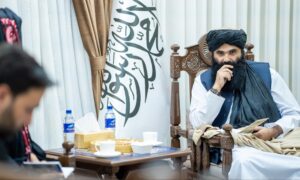
Haqqani says foreign enemies will not invade Afghanistan in near future
Latest News
Afghanistan signs 30-year deal for marble mining in Daikundi

The Ministry of Mines and Petroleum of Afghanistan has signed a 30-year agreement with a private company to extract marble in Daikundi province.
Under the contract, the company will invest AFN 283 million in exploring and mining marble at the “Mesh-Uliya” site, spanning 16.74 square kilometers in central Daikundi.
Hedayatullah Badri, Minister of Mines and Petroleum, stated that the marble will be processed domestically before being exported abroad. He added that the Mesh-Uliya project is expected to create around 200 jobs, and the company is committed to supporting local communities through social initiatives.
Economic experts highlight that such investments, especially those focusing on domestic processing, are crucial for job creation, boosting exports, and strengthening the national economy. Analysts further note that the project will improve local infrastructure, expand social services, and enhance the economic and social well-being of Daikundi residents.
Since the return of the Islamic Emirate to power, efforts to develop Afghanistan’s mining sector have intensified, with multiple contracts signed in areas including cement, copper, iron, and lapis lazuli, involving both domestic and international companies.
Latest News
Passenger bus veers off Salang Highway, leaving 5 dead, dozens injured
Latest News
Major fire in Mandawi Kabul market contained, extensive losses prevented
Local shopkeepers said the fire broke out around 4 a.m.
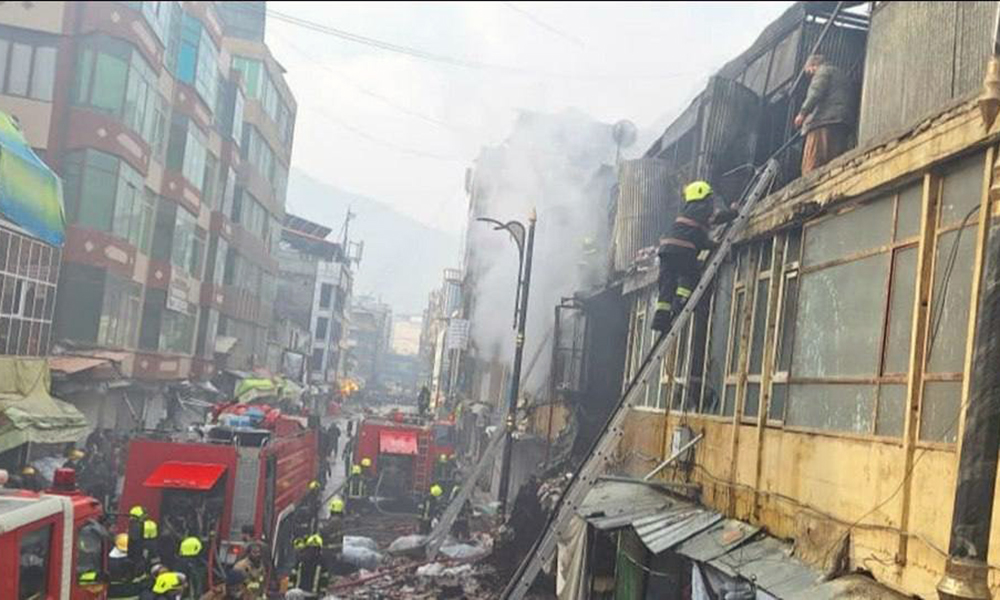
The Ministry of Interior reported that personnel from the General Directorate of Firefighting and Emergency Response successfully prevented the further spread of a fire at Mandawi market on Kabul early Sunday morning.
Abdul Mateen Qani, spokesperson for the ministry, said that the fire destroyed 10 storage facilities and 8 shops. He added that initial losses are estimated at around $700,000, but timely action by firefighting personnel saved property worth approximately $2.2 million.
Qani explained that the fire was caused by an electrical short circuit. He praised the rapid and effective containment operations, which prevented more extensive damage.
Local shopkeepers said the fire broke out around 4 a.m.
-

 International Sports5 days ago
International Sports5 days agoILT20: Abu Dhabi Knight Riders end Desert Vipers’ unbeaten run in dramatic one-run win
-

 Latest News3 days ago
Latest News3 days agoAfghan border forces prevent illegal entry of hundreds into Iran
-

 Latest News2 days ago
Latest News2 days agoPakistan summons Afghan diplomat over deadly attack in North Waziristan
-

 Business5 days ago
Business5 days agoMahirood Customs leads Iran’s exports to Afghanistan
-
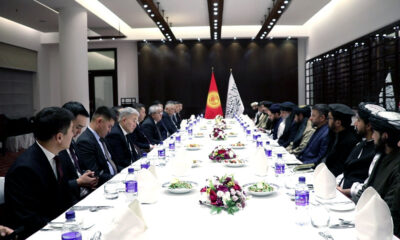
 Latest News5 days ago
Latest News5 days agoAfghanistan, Kyrgyzstan discuss expanding trade and economic cooperation
-

 Latest News3 days ago
Latest News3 days agoJapan allocates nearly $20 million in humanitarian aid for Afghanistan
-

 Latest News2 days ago
Latest News2 days agoKarzai urges reopening of girls’ schools and universities for Afghanistan’s bright future
-

 Latest News2 days ago
Latest News2 days agoAfghan health minister calls for medical cooperation between Kabul and New Delhi

